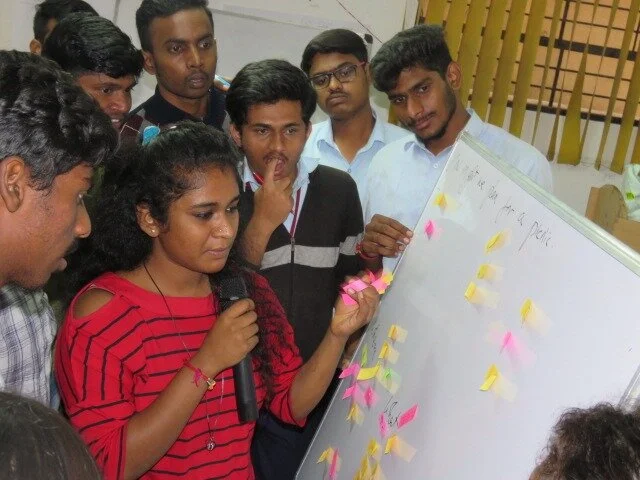YSI Conference 2019: Connecting Faculty & Students
“The best way to find yourself is to lose yourself in the service of others.”
— Mahatma Gandhi
In October 2019, the Youth Social Innovation (YSI) Conference turned its lens inward — not toward students alone, but toward the often-unseen gap between faculty and students.
What began as a student-led movement evolved into a powerful space where teachers became learners, and students became co-creators of change.
YSI 2019 asked a profound question:
“How might we connect with our students to improve classroom interactions?”
For the first time, the conference was designed specifically for faculty members — inviting them to reflect deeply on their role, challenge assumptions, and rebuild trust through empathy, dialogue, and shared learning.
Event Details
Conference Name | YSI Conference 2019 |
Theme | “How might we connect with our students to improve classroom interactions?” |
Date | October 15, 2019 |
Location | Srushti Degree College, Bangalore |
Format | In-person |
Participants | 11 faculty members |
Institutions Involved | 11 colleges and NGOs across India |

The Challenge That Inspired Change
-
Despite years of teaching experience, many faculty felt disconnected from their students. Classrooms were marked by:
- Passive silence instead of vibrant discussion
- Student disengagement due to mobile phones and lack of interest
- A growing sense of frustration: “They don’t care.”
Instead of blaming students, YSI invited teachers to ask:
How can I become more connected — not just as an instructor, but as a human being?
Inspired by Gandhian values — especially “The best way to find yourself is to lose yourself in the service of others” — educators embarked on a four-week journey of self-inquiry, prototyping, and reflection.
The result? Transformative models that reshaped classrooms into spaces of mutual respect and growth.
Innovative Models Born in 2019
Two powerful faculty-led models emerged from this conference.
1. Bridging Gaps Through Empathy and Trust
Team: Debamitra Ray, Mitra Lipi Priya, Pushpalatha
College: Srushti Degree CollegeThe Problem
Students were disengaged — distracted by phones, uninterested in academics, and reluctant to participate. Teachers felt unheard and undervalued.
The Solution
The team introduced non-academic projects where faculty and students collaborated as equals:
- Passion Project: Students explored personal interests
- Arts and Culture Week: Creative expression without grades
- Entrepreneurship Project: Real-world business ideas developed together
Weekly mentoring sessions helped build trust and emotional connection.
The Impact
- Students gradually opened up, seeing teachers as allies.
- Initiatives started small but grew into lasting programs.
- The college transformed into a “second home” with mutual respect at its core.
“The teacher-student barrier gave way to one of friendship… Empathy and being non-judgmental is what I learned.”
— Debamitra Ray, Srushti Degree College
2. Reconnecting Generations Through Freedom & Trust
Team: Padmavathi
College: Maharani Cluster UniversityThe Problem
Gen Z students expressed frustration:
“We are not trusted. We want liberty, not our parents’ lives.”
Meanwhile, teachers struggled with defiance, distraction, and disconnection.
The root issue? A generational clash: outer freedom (technology) vs. inner freedom (emotional autonomy).
The Solution
Padmavathi shifted from authority-driven teaching to “shadow teaching” — mentoring, not controlling. She introduced:
- Student interviews to understand unmet needs
- Democratic classrooms: Students co-designed rules
- Failure-friendly environments: Where mistakes were part of learning
- Self-responsibility practices: Encouraging ownership over behavior
The Impact
- Students engaged deeply when trusted as decision-makers.
- Teachers became allies, reducing friction.
- A culture of mutual understanding replaced resistance.
“We must treat students like adults, involve them in decisions, and let them grow — while offering support, not control.”
— Padmavathi, Maharani Cluster University
Conference Highlights
-
Chairperson: Ms. Jane Sahe, Former Faculty, Azim Premji University
“Education’s main goal is to help one discover his or her purpose in life in relation to the world they live in — for teachers and students. Teaching is a process of building relationships.”
-
Chief Guests:
- Prof. T.D. Kemparaju, Vice-Chancellor, Bangalore North University
Praised YSI as a meaningful initiative that should be “continuously practiced and encouraged.” - Ms. Vanitha Sharma (IAS), Commissioner for Development, Government of Karnataka
- Prof. T.D. Kemparaju, Vice-Chancellor, Bangalore North University
-
YSI Student Fellows: Niveditha, Shalini
-
Key Insight Explored:
Wellbeing begins with connection. When faculty look beyond performance and see students as whole human beings, transformation follows. -
Reflective Practice Papers: Each participant wrote about their journey — how listening changed their teaching philosophy.
Why YSI 2019 Mattered
This wasn’t just another professional development session. It was a radical reimagining of education.
From YSI 2019, we learned:
- Faculty need safe spaces to reflect — not just train
- Empathy breaks down walls faster than authority
- When teachers see themselves in their students, healing begins
- Co-creation isn’t just for students — it’s essential for educators too
As Lakshmi Hariharan says:
“YSI removed the hierarchy and brought students and faculty together as co-creators of a new campus culture.”
And Jane Sahe beautifully added:
“Teaching is not about transferring knowledge — it’s about building relationships.”
Legacy of YSI 2019
- Paved the way for future faculty engagement in YSI
- Proved that teacher wellbeing is directly linked to student flourishing
- Introduced the concept of “shadow teaching” — now used in multiple institutions
- Strengthened partnerships with Bangalore North University, which encouraged faculty participation across affiliated colleges
It showed that real change doesn’t come from top-down mandates — it grows from honest conversations, shared vulnerability, and a willingness to unlearn before relearning.

